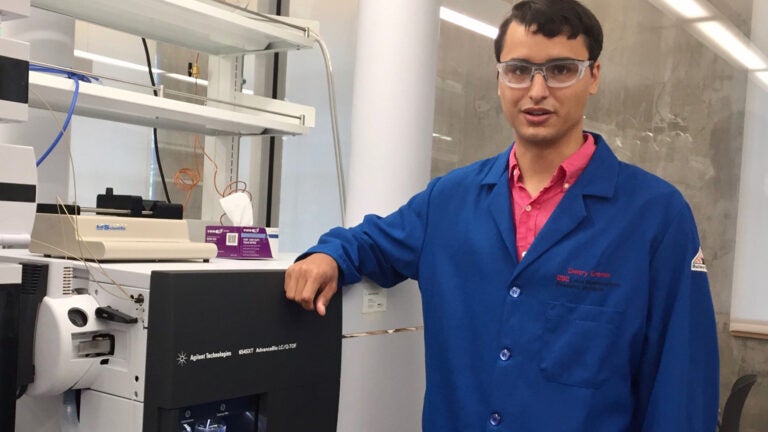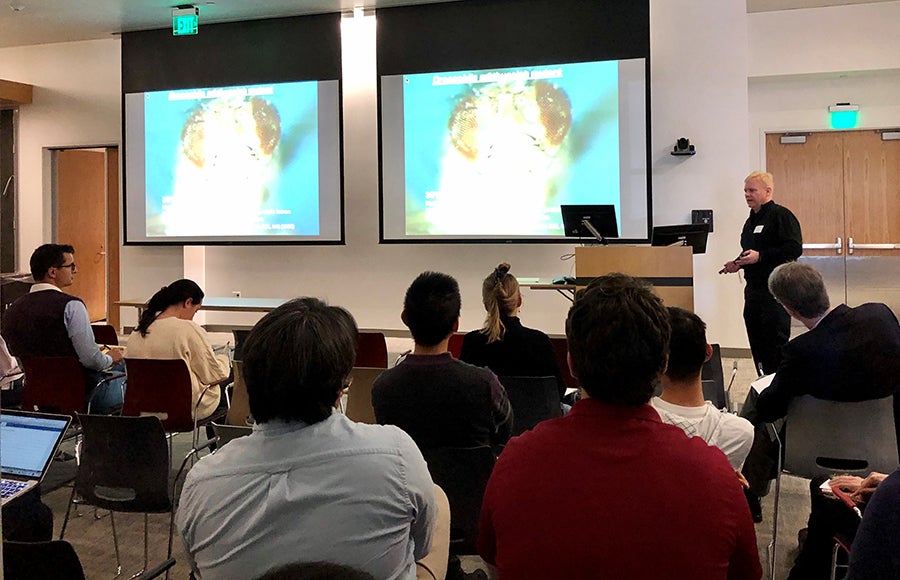
Agilent Postdoctoral Fellow undertakes molecular scrutiny of cells
USC researchers supported by a novel industry-academe partnership are probing uncharted biomedical territory: the landscape within individual living cells.
Not long ago, this level of scrutiny — examining one cell at a time on a molecular level — seemed virtually impossible.
“Only recently did the instrumentation come into being that makes it more achievable to look at a single cell,” said Dmitry Eremin. A postdoctoral researcher at the USC Dornsife College of Letters, Arts and Sciences, Eremin uses new, extremely sensitive equipment and techniques to study proteins and other cell components on an unprecedented scale that provides meaningful, useful data.
Eremin’s tools include more than $5 million in mass spectrometry, liquid chromatography instrumentation and robotics for biochemical and molecular studies, recently provided by Agilent, a global research, development and manufacturing company based in California’s Silicon Valley. These powerful, compact black and white stacks are neatly arrayed in clean white rooms in the Agilent Center of Excellence in Biomolecular Characterization at the USC Michelson Center for Convergent Bioscience.
The Agilent center is housed in shared space within laboratories of co-directors Valery Fokin, professor of chemistry at USC Dornsife, and Richard Roberts, professor of chemistry, chemical engineering and biomedical engineering at USC Dornsife and USC Viterbi School of Engineering.
“It is very much a two-way street and is much larger than just a physical facility,” said Fokin, who is Eremin’s mentor. “We’re especially excited about the opportunities here in terms of science and what can be done using this technology that we were lacking before.”
The USC-Agilent collaboration is designed to provide USC research groups with previously unavailable equipment, training on how to use it and opportunities to collaborate with Agilent scientists. It also supports the Agilent postdoctoral research program.
A skilled practitioner in mass spectrometry, Eremin applied for the new, competitive postdoctoral opportunity and was selected from a group of international applicants by a review team from USC and Agilent. He began a two-year stint as the first Agilent Postdoctoral Fellow in April 2019. Applications are under review for a second postdoctoral fellow to come on board in 2020.
More molecules, deeper understanding
One of Eremin’s projects uses cutting-edge mass spectrometry equipment and methods to identify and classify thousands of proteins within individual cells faster and with more accuracy than was previously possible.
“Mass spectrometry is one of the tools that allows us to see all the components of the cells,” Eremin said. Despite cells coming from the same tissue, each one still has unique and complex characteristics. The level of complexity is especially high with proteins, carbohydrates, lipids, and nucleic acids, which are large molecules and not well understood “machines” of cellular activity.
Better understanding the nature of single cells holds promise for better diagnosis and classification of disease and improved treatment options.
Despite monumental progress in understanding and treating diseases like cancer and diabetes, much remains unknown about the molecular underpinnings of disease within individual cells. This is both intriguing and frustrating to researchers.
Biological functions depend on events that occur within molecules and cells, and seeing signals and markers can yield important clues to understanding disease.
“Why do some cells in a tissue or organ become cancerous but others do not?” Eremin said. “Some cells participate, and other cells don’t participate in the proliferation of cancer at all. We need to find a way to distinguish the differences.”
Equally compelling is the mystery of how drug treatments do their job at a molecular level. “Nobody fully understands how drug molecules actually reach their targets and what is happening there in a precise way,” Eremin said. “We are trying to find out with atomic precision how complex biomolecules behave.”
In another project, Eremin is trying to chemically modify a cell receptor site considered central to pain relief. Long-term progress could help drug designers in their search for medicines that provide patients with effective pain management following surgery with reduced risk of dependency and overdose.
A ‘poster child’ for campus-corporate collaboration
The Agilent center’s location at the USC Michelson Center is by design: Michelson scientists and engineers aim to transform the way they conduct researchto confront the most critical health issues across disciplines.

Dmitry Eremin, far left, listens to a presentation by Richard Roberts of chemistry during a USC-Agilent joint symposium on Feb. 24. (Photo: Rhonda Hillbery.)
Corporate-university partnerships are considered increasingly important in the face of increased competition for federal funding for fundamental research. The idea behind the Agilent center is that USC brings expertise and access to skilled scientists and researchers, while Agilent contributes cutting-edge technologies that will contribute to scientific discovery.
Noting that USC retains intellectual property rights to research that results, Fokin calls the Agilent Center of Excellence a “poster child” for fruitful campus-corporate collaboration.
“I see it as a catalyst for innovation and for our researchers’ creative ideas,” Fokin said. “This relationship is flexible, evolving and uncertain, in a good sense. Uncertainty can be useful because it helps drive innovation and creativity.
“Medical applications, techniques for tracing small metabolites and finding markers for disease, which we simply didn’t have the technical capability of detecting before, will result.”
Agilent officials are equally enthusiastic. “This is a great opportunity … for all of us to move life science forward,” said senior executive Jacob Thaysen at the Agilent Center of Excellence’s 2018 dedication.
“These industry-university collaborations provide cross-discipline access to cutting-edge technologies, software solutions, applications and educational support,” all working in concert to advance research in disease diagnostics and drug discovery, said Steve Gagliardi, senior director of Laboratory Solutions at Agilent.